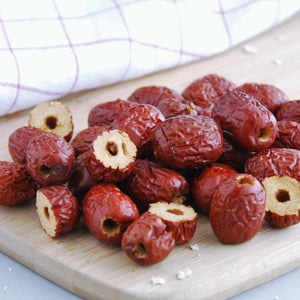TCM Mini-Series: 5 Tips For Health Preservation In Autumn
September 25, 2018

Red dates / jujube fruits are widely used in Traditional Chinese Medicine (TCM) to enhance health and well-being. In our TCM Mini-Series, we help demystify some basic health preservation concepts of Traditional Chinese Medicine and offer handy tips for how to apply them in your daily life.
TCM Mini-Series: 5 Tips For Health Preservation In Autumn
The temperatures are falling and the days are getting shorter. With autumn on the way, the yang energy in the body decreases and the yin energy gradually rises. This is considered a transitional period from abundant yang energy to profuse yin energy in Traditional Chinese Medicine. Here are some suggestions to help preserve your health in this period.
-
The temperature in autumn is cool but not too cold to endure. It is important that people strengthen their body now to help adapt to the yin energy and colder conditions, in order to build a good foundation for winter.
-
Eat warming foods such as ginger, jujube fruits, walnuts, hot pepper, sweet potatoes to help strengthen yang energy naturally.
- During autumn, the weather is dry, moisture is often insufficient, and this dry condition can cause issues. The skin may lose moisture and elasticity, and the respiratory passage can become inflamed. Remember to apply oil on your skin, and keep hydrated by drinking lots of water and tea. Foods for nourishing the yin and moisturising the body are pears, lotus root, spinach, soy milk for examples.
-
Vulnerable groups such as babies and the elderly should pay special attention. The cold in autumn can weaken the immune system and the digestive tract, so one should pay attention to keep the body warm and the abdominal covered at all times.
-
Seasonal emotional imbalance can be alleviated by getting more sunlight, increasing physical exercises, eating more fresh vegetables, fruits, and good quality proteins.
RECAP: The concept of yin and yang
-
Yin and Yang is an ancient Chinese philosophy used to describe how apparently opposite forces are complementary to each other, and that it is necessary for these forces to be balanced for wellbeing.
-
Yang deficiency - typical features: pale face, feeling of weakness, easily sweating, cold hands and feet. An imbalance of the yin pattern (yang deficiency) could weaken digestion and lead to dampness which may occur in vegetarians or those who eat primarily raw food. Aerobic exercise is essential for Yin imbalance. Beneficial vegetables include cooked root vegetables, baked squash, onions, and mustard greens. Red Dates, nuts and seeds are warming as well as spicy foods such as pepper and garlic.
-
Yin deficiency - typical features: feverish sensation in the palm and soles, dry mouth and throat, poor sleep, flushed face, hot-tempered etc. An imbalance of yang pattern (yin deficiency) may result in impatience, anger, headache, nose bleeding etc. This pattern often shows up in hot weather or with stress. Meditation, walks in nature, swimming and yoga are ideal ways to achieve balance. Beneficial foods include salads, cucumbers, lightly cooked green leafy vegetables, especially spinach.
Did you know that red dates / jujube fruits have mildly warming properties, which can help build up yang energy in the body? According to TCM, they have the ability to strengthen the spleen and stomach, replenish qi, nourish and produce blood and tranquilize the mind. Find red dates / jujubes here.
